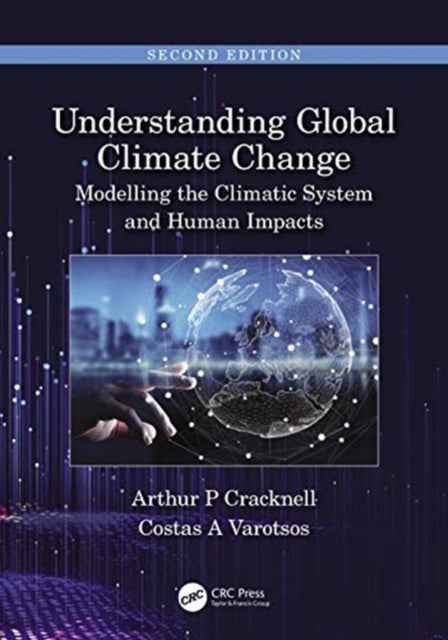Arthur P Cracknell,Costas A Varotsos
Understanding Global Climate Change: Modelling the Climatic System and Human Impacts
Understanding Global Climate Change: Modelling the Climatic System and Human Impacts
YOU SAVE £3.17
- Condition: Brand new
- UK Delivery times: Usually arrives within 2 - 3 working days
- UK Shipping: Fee starts at £2.39. Subject to product weight & dimension
Bulk ordering. Want 15 or more copies? Get a personalised quote and bigger discounts. Learn more about bulk orders.
Couldn't load pickup availability
- More about Understanding Global Climate Change: Modelling the Climatic System and Human Impacts
Climate change is a complex issue caused by a variety of human activities, including the generation of carbon dioxide. It requires action from politicians and society at national and global levels to address.
\n Format: Paperback / softback
\n Length: 428 pages
\n Publication date: 28 July 2021
\n Publisher: Taylor & Francis Ltd
\n
Provides a thought-provoking and original approach to the science of climate.
Emphasizes that there are many factors contributing to the causation of climate change.
Clarifies that while anthropogenic generation of carbon dioxide is important, it is only one of several human activities contributing to climate change.
Considers climate change responses needed to be undertaken by politicians and society at national and global levels.
Totally revised and updated with state-of-the-art satellite data and climate models currently in operation around the globe.
Climate change is a complex and multifaceted phenomenon that requires a comprehensive and interdisciplinary approach to understanding its causes and potential solutions. In this essay, we will explore the science of climate change, its factors contributing to its causation, and the responses needed to address it at both national and global levels.
The science of climate change is based on a wealth of data and observations collected over centuries by scientists from various fields, including meteorology, geology, physics, and biology. These data indicate that the Earth's climate has been changing for millions of years, driven by a variety of natural and human-induced factors.
One of the most significant factors contributing to climate change is the increase in greenhouse gases, particularly carbon dioxide (CO2). CO2 is released into the atmosphere through human activities such as burning fossil fuels, deforestation, and agriculture. These activities trap heat in the Earth's atmosphere, leading to a warming effect known as global warming.
Other human activities that contribute to climate change include the burning of biomass, such as wood and charcoal, and the use of fertilizers and pesticides. These activities release nitrous oxide (N2O) and methane (CH4), which are also greenhouse gases that have a significant impact on the Earth's climate.
In addition to human activities, natural factors such as volcanic eruptions, solar radiation, and changes in Earth's orbit can also contribute to climate change. These natural factors are known as external forcings, and they can offset or amplify the effects of human-induced greenhouse gas emissions.
Despite the many factors contributing to climate change, it is important to recognize that anthropogenic generation of carbon dioxide is the primary driver of global warming. This is because CO2 has a much higher heat-trapping capacity than other greenhouse gases, and it remains in the atmosphere for much longer periods of time.
However, it is not just the generation of carbon dioxide that is important. Other human activities, such as deforestation, land use change, and industrial processes, also have significant impacts on the Earth's climate. These activities can release large amounts of greenhouse gases into the atmosphere, leading to further warming and climate change.
To address climate change, it is essential to take a comprehensive and multi-faceted approach. This includes reducing greenhouse gas emissions through measures such as energy efficiency, renewable energy, and carbon pricing. It also includes adapting to the impacts of climate change, such as improving water management, protecting vulnerable ecosystems, and developing resilient communities.
At the national level, governments can play a crucial role in addressing climate change. This includes setting targets for reducing greenhouse gas emissions, implementing policies and regulations to promote renewable energy and energy efficiency, and investing in research and development to develop new technologies and solutions.
At the global level, international cooperation is essential to address climate change. This includes agreements such as the Paris Agreement, which aims to limit global warming to 2°C above pre-industrial levels, and the United Nations Framework Convention on Climate Change, which provides a framework for international cooperation on climate change.
In conclusion, climate change is a complex and multifaceted phenomenon that requires a comprehensive and interdisciplinary approach to understanding its causes and potential solutions. While anthropogenic generation of carbon dioxide is the primary driver of global warming, other human activities, natural factors, and external forcings also play a significant role. To address climate change, it is essential to reduce greenhouse gas emissions, adapt to the impacts of climate change, and promote international cooperation. By taking these steps, we can help to ensure a sustainable and healthy future for ourselves and future generations.
\n Weight: 940g\n
Dimension: 177 x 252 x 26 (mm)\n
ISBN-13: 9781032001616\n
Edition number: 2 New edition\n
This item can be found in:
UK and International shipping information
UK and International shipping information
UK Delivery and returns information:
- Delivery within 2 - 3 days when ordering in the UK.
- Shipping fee for UK customers from £2.39. Fully tracked shipping service available.
- Returns policy: Return within 30 days of receipt for full refund.
International deliveries:
Shulph Ink now ships to Australia, Belgium, Canada, France, Germany, Ireland, Italy, India, Luxembourg Saudi Arabia, Singapore, Spain, Netherlands, New Zealand, United Arab Emirates, United States of America.
- Delivery times: within 5 - 10 days for international orders.
- Shipping fee: charges vary for overseas orders. Only tracked services are available for most international orders. Some countries have untracked shipping options.
- Customs charges: If ordering to addresses outside the United Kingdom, you may or may not incur additional customs and duties fees during local delivery.


